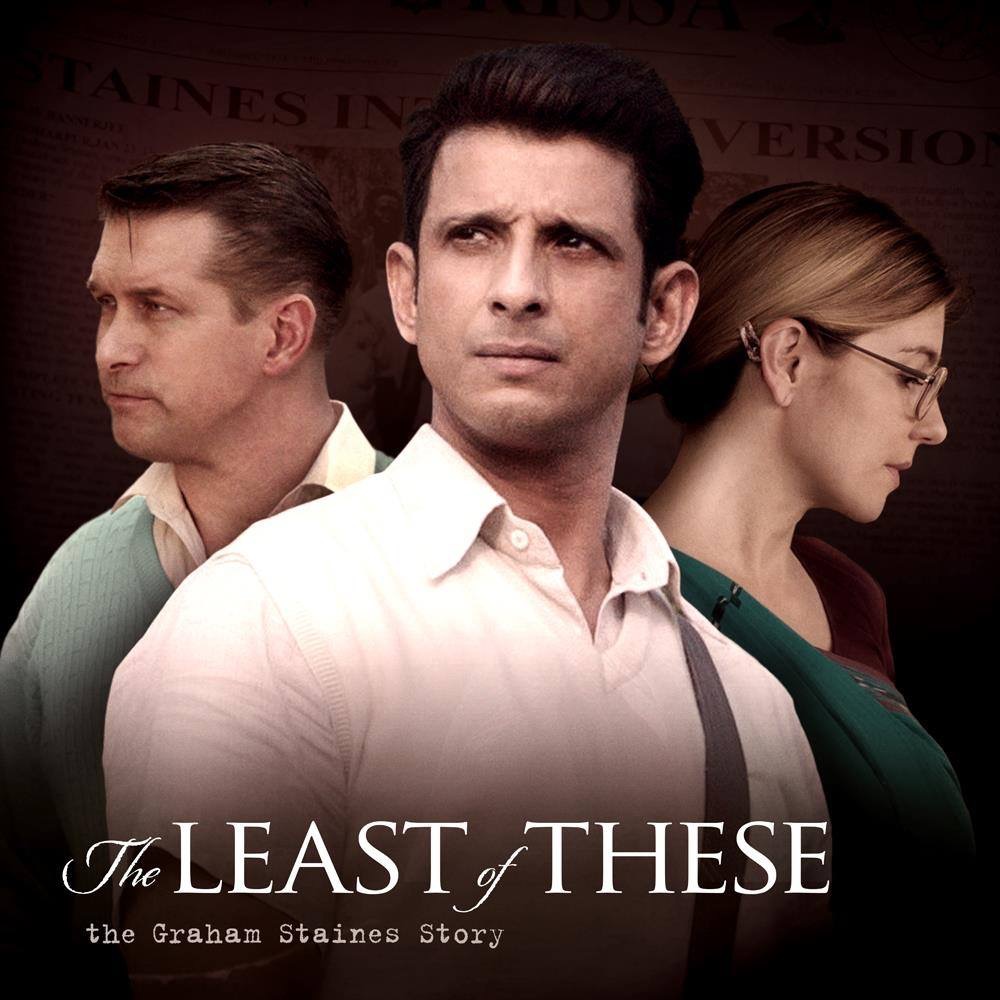
by Michael Foust | Feb 1, 2019
The faith-based film ‘The Least of These’ opens this weekend, telling the true story of Graham Staines, a career missionary whose life ended in a tragedy that gained worldwide headlines.
Graham Staines is a fearless-yet-careful missionary living in a country, India, that doesn’t trust Christians.
The year is 1999, and the 50-something Australian is working among India’s lepers, giving them medicine that heals but also offering the hope that only the Gospel can provide. For many lepers, he is their only friend. That’s because lepers are considered heavily contagious and outcasts for life, even though most people can easily fight off the disease.
“He is taking care of lots of people who were rejected by
their own people,” one acquaintance says.
Yet in a country that is 80 percent Hindu and that cares
deeply about its traditions, Staines is viewed skeptically.
One such skeptic is Manav Banerjee, a journalist who is
trying to impress his editor and who believes Staines is violating the region’s
forced conversion laws, which prohibit changing religion against one’s will.
That may sound appealing on first blush, but—practically—such laws have a
chilling effect on religious freedom. Every allegation must be investigated.
And every conversion must be reported to the government.
Yet Banerjee discovers only positive things about Staines,
who is careful to follow the law. Everyone around Staines likes him.
This does little to appease Banerjee’s editor, a skeptic of
Christianity who urges him to dig even deeper, no matter the cost.
The faith-based film The
Least of These (PG-13) opens this weekend, telling the true story of Graham
Staines, a career missionary whose life ended in a tragedy that gained
worldwide headlines. It stars Stephen Baldwin as Staines; Shari Rigby as his
wife, Gladys; and Indian actor Sharman Joshi as Banerjee.
The movie puts a spotlight on India’s many laws restricting
religious freedom. Such laws remain in effect, two decades after Staines’
death.
Warning:
minor/moderate spoilers!
(Scale key:
none, minimal, moderate, extreme)
Violence/Disturbing
Minimal/moderate. The film begins by showing the bombing of
a building, and we learn via news clips that churches throughout the region
have been bombed, too. A man who appears to have leprosy is kicked off a bus. A
group of Indian men plot to attack Staines. Staines was martyred alongside his
two sons, and the event is presented tactfully; it takes place at night when
they are sleeping in a van. The vehicle is set ablaze, and we see Staines beg the
murderers to let his boys go (They don’t). The scene cuts away before he is
ablaze.
Sexuality/Sensuality/Nudity
None. A few women in traditional, belly-revealing Indian
dress are seen.
Coarse
Language
None.
Other
Positive Elements
The contrast between Staines and everyday citizens is
dramatic. The film shows a man with leprosy being kicked off a bus. Minutes
later, Staines picks him up and lets him ride in his vehicle.
Life Lessons
The film has two major themes: missions and forgiveness. The
filmmakers want moviegoers to consider the missions focus of Staines, who
became convicted as a teenager of the need to take the Gospel to India. The
movie also focuses on Gladys’ choice to forgive. She was left a widow to raise
a young daughter. The film promotes an organization, iForgive.com.
Worldview/Application
In many ways, Staines’ ministry reflected that of Christ,
who also loved lepers (Luke 5:12–16, Luke 17:11-19). Jesus, too, treated lepers
as the image-bearers of God that they were. Jesus, too, wanted them to know the
Gospel.
But would we have had the conviction of Staines? Would we
have taken the Gospel to a diseased people, knowing we might die a miserable
death?
Staines died in 1999, but his legacy lived on. One political
editor at the time wrote,
“He converted leprosy patients into human beings, for the treatment meted out
to them even by their near and dear ones was worse than that given to animals.
The Hindu fundamentalists responsible for the killing of Staines and his two
sons should know that the loss of these three lives is not to Christianity, but
to humanity at large.”
What Works
The use of Indian actors and the choice to film it in India.
It gives the movie a realistic look.
What Doesn’t
Staines’ story is filled with powerful messages, but too
often the film lacks the emotion to match the real-life subject.
Discussion
Questions
1. Why did Staines want to take the Gospel to India’s
lepers?
2. What lessons can we learn from his life?
3. What can we learn from the life of his wife?
Entertainment rating: 3 out of 5
stars. Family-friendly rating: 4.5
out of 5 stars.
Rated PG-13
for thematic elements/disturbing images.
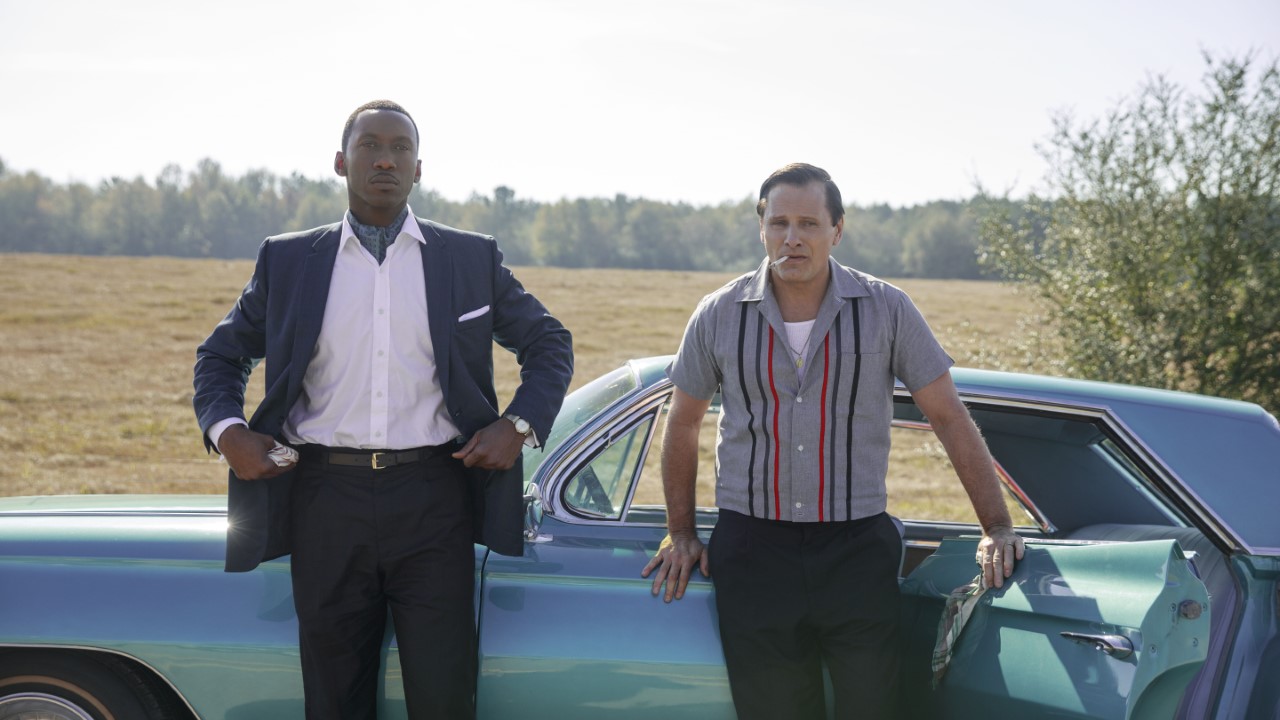
by Michael Foust | Feb 1, 2019
Green Book (PG-13) tells the story of two polar-opposite men from different races who become friends during a musical tour of the South. The film has a good message, but it also has rough PG-13 content.
Tony is a hard-working Italian American who also happens to be the toughest bouncer at the famous New York City nightclub, the Copacabana.
He’s the kind of guy you never cross and you never insult.
In other words, he’s the type of guy you’d want on your side in a dangerous
situation.
Thus, it’s not surprising when the famous concert pianist, Dr. Don Shirley, contacts Tony prior to embarking on a tour with his instrumentalist trio to the Deep South. The year is 1962, and Shirley, an African American, knows he could face trouble in segregated cities where he isn’t allowed to use the restroom or eat at the restaurant. Shirley wants Tony to be his chauffeur and bodyguard, and he promises to pay him handsomely.
There’s just one problem. Tony doesn’t like black people.
But with the Copacabana undergoing renovations for two
months—and with a wife and kids to support—Tony swallows his pride and takes
the job. Who knows? It could be fun. It even could change Tony for the better.
The movie Green Book (PG-13)
opened in November but has seen renewed interest lately after winning a Golden
Globe for Best Musical or Comedy and for being nominated for an Academy Award
for Best Picture. It stars Viggo Mortensen (The
Lord of the Rings trilogy) as Tony Vallelonga and Mahershala Ali (Free State of Jones, Spider-Man: Into the
Spider-Verse) as Shirley.
The film was inspired by a true story and gets its name from
“The Negro Motorist Green Book,” a real-life booklet that was used by blacks
during segregation to help them find welcoming accommodations.
The movie tells the story of two men who are worlds apart
but grow to become friends and appreciate one another’s differences during an
eight-week road trip. Shirley is cultured, quiet and reserved. Tony is blue
collar, loud and opinionated. Shirley never curses. Tony does… often.
Green Book spotlights an ugly era in American history in which African Americans were loved for their music but were treated as second-class citizens in the very theaters they performed. Shirley knew he would face verbal and even physical violence but rightly believed his talent could be a “foot in the door” to change the hearts and minds of racists. Indeed, music did play a big role in America’s integration. Shirley was a hero.
The film is entertaining and filled with positive messages
but is somewhat marred by an excessive amount of language.
Warning:
minor/moderate spoilers!
(Scale key:
none, minimal, moderate, extreme)
Violence/Disturbing
Minimal/moderate. Tony, as a bouncer and then a bodyguard,
punches multiple people during the film. He hits a man several times outside
the nightclub—so much so that a friend wondered if he was going to kill him. He
hits a police officer in the South for calling him “half a” N-word. But his
toughness comes in handy when Shirley is being punched by several men in a bar;
it ends without Tony hitting anyone.
Sexuality/Sensuality/Nudity
Moderate. Twice, Tony makes vulgar remarks about the female
anatomy. Shirley tells Tony he formerly was married to a woman; yet later, Tony
is called by the police to the YMCA after Shirley is caught nude with a white
man. The implication is that Shirley is gay (The men apparently were nude in
the shower or pool but are covered when we see them). In real life, Shirley
never came out as gay, although Tony Vallelonga’s son was a writer and producer
of the film and says the incident happened.
Coarse
Language
Extreme. Nearly 70 coarse words: S–t (22), GD (14), a–
(11), h–l (8), misuse of “Jesus” or “Christ” (4), b—-rd (3), f-word (2),
d–n (1), SOB (1), misuse of “God” (1). We also hear several racial slurs,
including the n-word at least once.
Other
Positive Elements
Tony’s family is tight-nit and prays before the meal (We hear
the phrase “Christ our Lord”). He may be a tough guy, but he’s a family man,
too, and he loves his wife and children. He even writes romantic letters to her
from the road.
Other Stuff
You Might Want To Know
Several scenes involve drinking, smoking and gambling.
Life Lessons
Shirley provides lessons on courage and conviction. He also
reflects Martin Luther King Jr.’s goal of nonviolence (When Tony punches a
police officer, Shirley chastises him: “You never win with anger… Dignity
always prevails.” The story proves Shirley right). Both men give us lessons on
pride, humility and admitting when you’re wrong. They change one another for
the better. When Tony’s family member uses a racial slur toward the end, he
corrects them.
Worldview/Application
Scripture tells us that all people bear the image of God
(Genesis 1:26-27). In God’s kingdom, there is one race—the human race. Racism
by its very nature is unloving. God hates it.
Green Book forces us to ask: Why did people of yesteryear pay to watch African Americans perform, but then refuse to give them the same benefits afforded every other person? During one poignant scene at a mansion, Shirley is told to use the outhouse, not the indoor restroom. During another scene, he is told he cannot eat in a restaurant—even though he is set to play the piano to the audience at the end of the meal. They wanted him to perform, but they didn’t want to treat him as a person.
That type of twisted, satanic logic cannot survive very
long, and in the real world, it didn’t.
Music helped end segregation, as young white teens were
introduced to songs by talented black musicians, and young black teens listened
to tunes by talented white musicians. Eventually, the crowds began mixing, and
the music styles did, too.
This isn’t to say that all the music glorified God. It
didn’t. But the music did help people
see the humanity—and the image of God—in one another.
Segregation died. Music played a big role.
Green Book is far from being a faith-centric
film. It’s not a stretch, though, to see a God-centered message in it.
What Works
The story. The chemistry between Tony and Shirley. The two
actors (Mortensen and Ali) are spectacular.
What Doesn’t
The excessive language. It’s distracting and over the top.
Discussion
Questions
1. What is at the heart of racism? What is the solution?
2. What caused Tony to change his mind about black people?
3. How did Shirley change throughout the movie?
4. Why did Shirley want to perform in the South, even though
he knew what might happen?
5. How did music impact segregation?
Entertainment rating: 3 out of 5
stars. Family-friendly rating: 2 out
of 5 stars.
Rated PG-13 for thematic content, language including racial epithets, smoking, some violence and suggestive material.
PHOTO CREDIT: DreamWorks
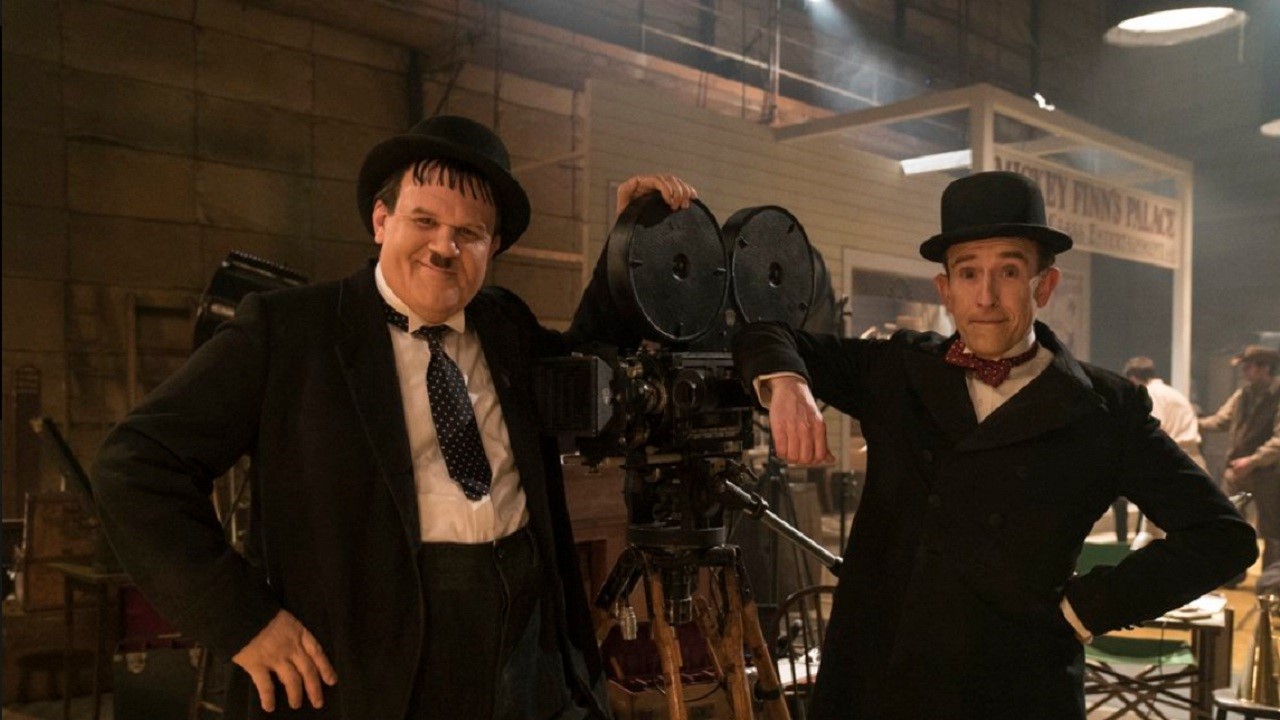
by Michael Foust | Jan 25, 2019
The film Stan & Ollie (PG) expands nationwide this weekend, telling us the story of the popular comedic team Laurel and Hardy as they try and revive their aging careers.
Stan and his friend Oliver were once the most famous comedy duo in the world.
But that was 16 years ago, when they had weathered the death of silent films to become successful in feature-length sound movies, too.
It is now 1953, and the tandem known as Laurel and Hardy have embarked on a multi-city tour of Europe for a series of live shows, where they’ll perform their hilarious acts for fans and newcomers alike. Who knows? They may win another movie deal out of it.
If only people would come.
The first few shows are less than half full. The hotels, too, are unremarkable. Stan and Oliver are accustomed to big rooms and bellboys, but the budget only allows basic amenities. They’ll have to carry their own luggage.
“I thought you had retired,” one hotel employee tells them.
It seems people nowadays prefer the newer comedy tandem: Abbott and Costello.
Yet something extraordinary happens as their tour progresses. Word begins spreading. Theaters begin filling. Stan and Oliver are funnier than ever.
Maybe they will get a movie deal. And maybe they’ll learn to become true friends… in the twilight of their careers.
The film Stan & Ollie (PG) expands nationwide this weekend, telling us the story of the popular comedic team as they try to revive their aging careers. It stars Oscar nominee Steve Coogan (Despicable Me 2 and 3) as Stan Laurel and John C. Reilly (Wreck-It Ralph), another Oscar nominee, as the hefty Oliver Hardy.
The movie tells the story of two men who had little more than a working relationship in their younger lives but grew to appreciate one another as their careers were ending and they were running out of money.
It is among the funniest films I’ve seen, and proves once again that the most creative humor is the cleanest humor. Coogan and Reilly are spectacular.
Warning: minor/moderate spoilers!
(Scale key: none, minimal, moderate, extreme)
Violence/Disturbing
None.
Sexuality/Sensuality/Nudity
Minimal. We see women in one-piece swimsuits in a “bathing beauty” contest.
Coarse Language
Minimal: A– (3), d–n (2), h-ll (1). Also: dear G-d (2).
Other Stuff You Might Want To Know
Several characters drink and smoke. One character places a bet over the phone.
Positive Elements/Life Lessons
Stan and Oliver provide lessons on bitterness, forgiveness and forgiveness.
At the heart of their divide: Oliver’s decision to get a different comedy partner years earlier when Stan was holding out for a bigger contract.
“You betrayed me,” Stan says.
Oliver responds, “You loved Laurel and Hardy, but you never loved me.”
But by the movie’s end, they reconcile and have a close friendship. It’s touching to watch.
Worldview/Application
Our society worships fame. It’s at the heart of popular music, gossip magazines, television sports, and Hollywood movies. But just like that easily distracted dog in Up (“squirrel!”), our attention span is brief. The only thing we like more than celebrities are new celebrities.
Laurel and Hardy didn’t lose fans by becoming less funny. No, the public simply moved on to something else. At their pinnacle, most Americans knew who they were. Nowadays, very few do.
Fame, like everything else in life, is fleeting. James tells us that our lives are like “a mist that appears for a little time and then vanishes” (James 4:14).
The things of this world don’t last. Instead of compiling treasure on earth, our focus should be on eternal matters—treasure in heaven (Matthew 6:19-20).
What Works
The comedy, which required practice and impeccable timing. We don’t hear a single curse word in their show, but it’s funnier than anything on Netflix.
What Doesn’t
Not applicable.
Discussion Questions
- What made Laurel and Hardy so funny?
- What can we learn about fame and popularity from their story?
- What can we learn about forgiveness and friendship?
Entertainment rating: 4.5 out of 5 stars. Family-friendly rating: 3.5 out of 5 stars.
Rated PG for some language, and for smoking.
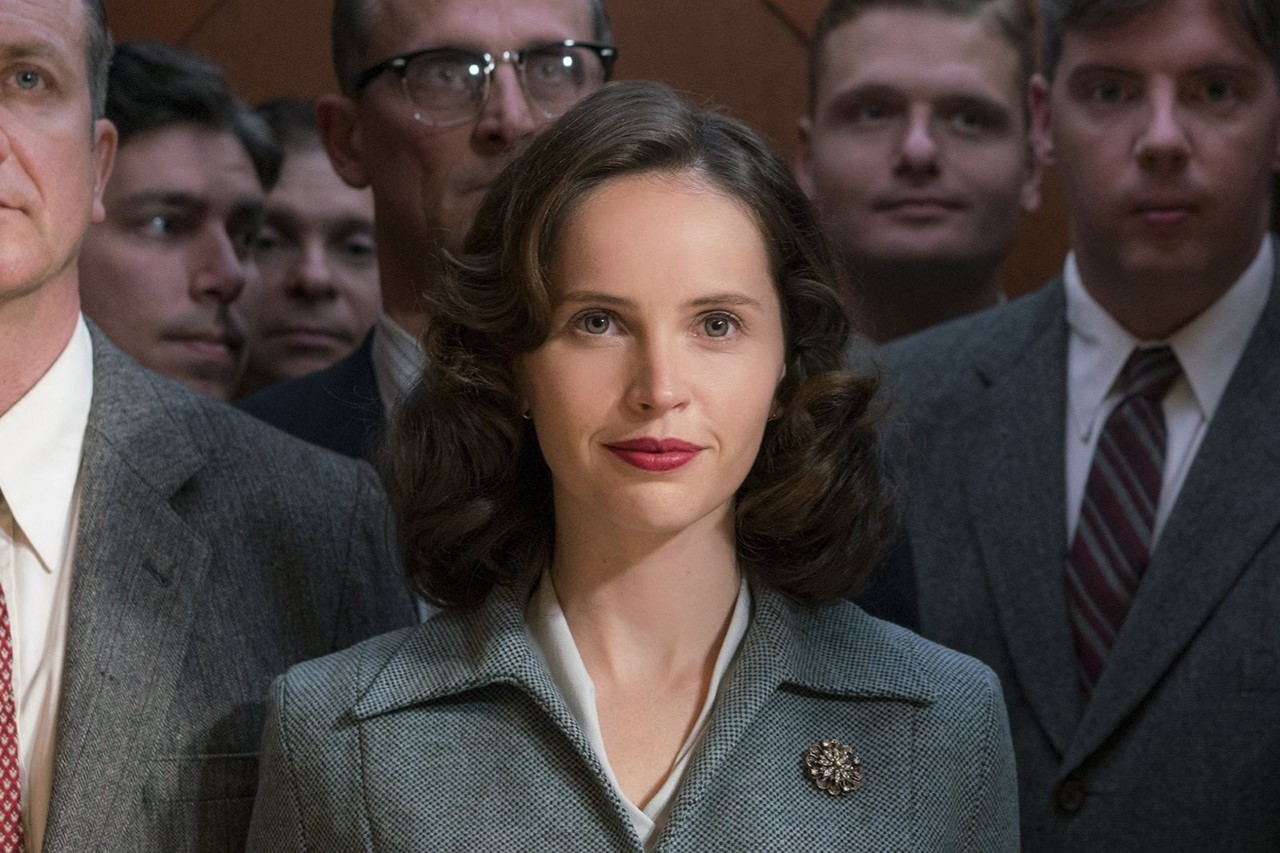
by Michael Foust | Jan 25, 2019
‘On the Basis of Sex’ provides only a partial view of the life of Ruth Bader Ginsburg, one of the Supreme Court’s most liberal justices.
Ruth is a brilliant young female attorney living in a male-dominated legal world.
The year is 1959, and although she graduated at the top of her class in one of the nation’s most prestigious schools, Ruth can’t land a job in a law firm. Some male lawyers believe she should use her skills as a secretary. Others would like to hire her, but fear their wives would become jealous.
So Ruth takes a position as a law professor at Rutgers University. There, she will mold the nation’s future lawyers to enter the fast-changing world of the 1960s. The job also will allow her to practice law in the courtroom if the right case arises.
Such a case lands in her lap when she learns about Charles Moritz, a Colorado single man who is taking care of his ailing mother and wants the same tax benefits for hiring a nurse that are afforded to women. But the federal tax law allows only females to use the tax deduction when hiring in-home nurses.
Ruth believes if she can convince a federal court to overturn a law that unfairly targets a man, then it could lay the groundwork for overturning laws that unfairly target women.
Will her strategy work?
The movie On the Basis of Sex (PG-13) is now playing in theaters, giving us an overview of the early life of now-Supreme Court Justice Ruth Bader Ginsburg. It begins with her entrance into Harvard Law School in 1956 and ends with her arguing Moritz’s case before the U.S. 10th Circuit Court of Appeals in the early 1970s. Her nephew, Daniel Stiepleman, wrote it.
Although Ginsburg is one of the nation’s most socially liberal justices—supporting legalized abortion and same-sex marriage, for example—the film aims for broad appeal by spotlighting her targeting of sexually discriminatory laws. She complains that wives should not have to sign up for credit cards in their husbands’ names. She says women aren’t allowed to work overtime. She notes that there were no women’s restrooms when she began attending law school.
The word “abortion” is never heard in On the Basis of Sex, even though she became one of the biggest supporters of its legalization. Perhaps this is because Ginsburg didn’t play a direct role in the 1973 ruling.
The result is that people from both parties can watch the film and cheer her, even if her legal philosophy needs to be questioned. One such example is when Ginsburg in the film argues that times are changing and that the law is behind the public sentiment. This begs the question: Then why not pressure the legislature to change the law? Or change the legislature?
In fact, the real-world Ginsburg said in 2013 that she regretted how abortion was legalized—with one case overturning all pro-life laws nationwide. Roe, she said, became “a symbol for the right to life movement.” She would have preferred a piecemeal approach to legalizing abortion— although, for sure, it still would have come through the legal process.
“That would have been my ideal vision of how this would have been evolved,” she said.
Like the real-world Ginsburg, the big-screen Ginsburg (played by Felicity Jones) supports incremental change, too. Her goal in the film is to take on each law where men and women are viewed differently. Supposedly, there were 178 of them. When the three justices ask her if she’s wanting to overturn all 178 laws, she says, “No.” She’s only fighting to overturn one section of the tax law. Legal attacks on the other ones will come later.
“We’re not asking you to change the country,” she says. “That’s already happened without any court’s permission. We’re asking you to protect the right of the country to change. Our sons and daughters are barred by law from opportunities based on assumptions about their abilities.
“You have the power to set the precedent that will get us started.”
There’s a lot to like about Ginsburg in On the Basis of Sex. She fought for common-sense women’s rights that all women today—conservative and liberal—enjoy. She backed an incremental approach that leaders in any movement would be wise to use. She also was a devoted wife and mother of two children. The film shows her caring for her sick husband when he faced the possibility of death after a testicular cancer diagnosis. She even attended his classes and took notes (He was in law school, too).
But lurking in the background, unsaid, is her stance on more controversial decisions. As a Supreme Court justice in 2000, she voted with the majority for legalized legal partial-birth abortion—a procedure in which an unborn late-term baby is partially delivered, feet-first, before its brain is suctioned. When a similar case came before the court in 2007, she voted the same way again, although this time she was in the minority. In 2018, she joined dissenting justices who would have required pro-life pregnancy centers to hang signs about the availability of abortion.
It’s easy to cheer for the Ginsburg in On the Basis of Sex. It’s just not the full picture.
Content warnings:
Warning: minor/moderate spoilers!
(Scale key: none, minimal, moderate, extreme)
Violence/Disturbing
None.
Sexuality/Sensuality/Nudity
Minimal/moderate. We see Ginsburg disrobe down to a slip and kiss her husband in the bedroom. The scene then cuts away.
Coarse Language
Moderate. A– (4), s–t (3), D–n (2), misuse of “Jesus” (1), misuse of “God” (1), b–ch (1), b—ard (1), f-word (1), d–k (1), “h-ll no” as part of a chant — several times.
Discussion Questions
- Is Ginsburg a legal hero? Why or why not?
- Name three positive traits about Ginsburg from the movie. Name three negative ones (from either the film or real life).
- What led to abortion’s legalization?
Entertainment rating: 3 out of 5 stars. Family-friendly rating: 3 out of 5 stars.
Rated PG-13 for some language and suggestive content.
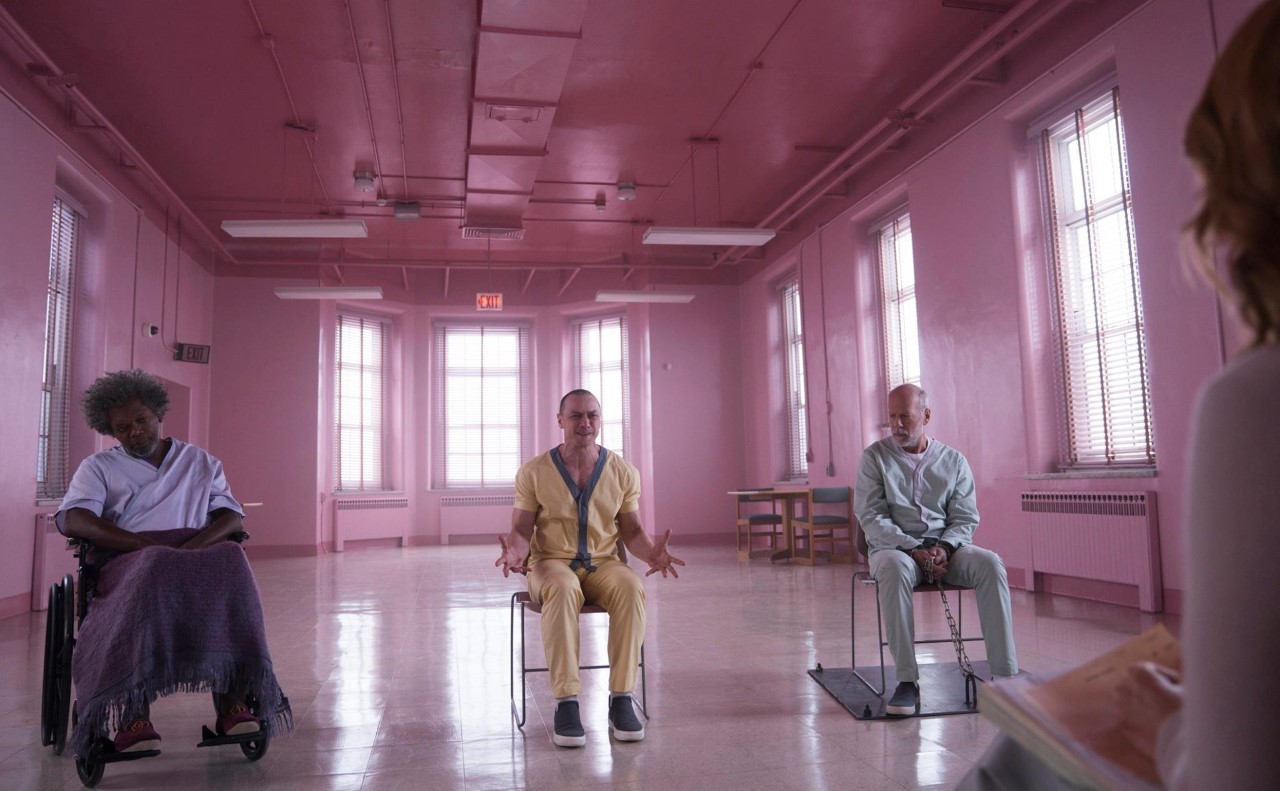
by Michael Foust | Jan 18, 2019
The film ‘Glass’ (PG-13) opens this weekend, completing the trilogy by writer/director M. Night Shyamalan that began with sci-fi/drama film ‘Unbreakable’ (2000) and continued with the thriller ‘Split’ (2016). It gives us a muddled message about talents and everyday superheroes—even though those are supposedly the film’s major themes.
David Dunn is an unassuming middle-aged man who runs a home security system during the day and dons a cape-like poncho to fight crime at night.
That’s when he becomes the “Overseer,” a shadowy figure with super strength who makes headlines for his good deeds but is viewed with suspicion by the Philadelphia police, who consider him a vigilante. They want him in jail.
That threat of arrest, though, doesn’t prevent Dunn from trying to solve the city’s latest crime: the kidnapping of four cheerleaders by a crazed man known as the “Beast,” who has multiple personalities and has killed several people.
Dunn and his son, Joseph, believe they can pinpoint the Beast’s location by using police records, a computer program and a ton of detective work.
Their hard work pays off one day when Dunn finds the Beast’s abandoned warehouse, sets the cheerleaders free, and goes “mano a mano” against this evil villain.
But then the plan goes awry. The police show up and surround Dunn and the Beast. Both are arrested and committed to the psychiatric ward, where they will be studied by a doctor—Ellie Staple—who believes they have severe mental problems. She also thinks the two men are wrong in their conviction that they have super strength.
Superheroes, she insists, don’t exist.
The film Glass (PG-13) opens this weekend, completing the trilogy by writer/director M. Night Shyamalan that began with sci-fi/drama film Unbreakable (2000) and continued with the thriller Split (2016). It stars Bruce Willis (Die Hard) as Dunn, James McAvoy (Split) as Kevin Wendell Crumb/the Beast, Sarah Paulson (Ocean’s Eight) as Staple, and Samuel L. Jackson (Avengers series) as Elijah Price.
The film is part-superhero film and part-thriller, but it’s mostly just weird and dull.
Dunn, the Beast and Price all have extraordinary talents (or is it powers?) and believe they are superheroes, yet Staple refuses to acknowledge their abilities. Everything, she says, has a natural explanation.
Glass has the surprising/shocking ending that Shyamalan’s films are known for, but it also has a muddled message about talents and everyday superheroes—even though those are supposedly the film’s major themes.
There’s also this: Much of the action in the film’s final scenes takes place outside, in the daytime, which lessens the hair-raising potential. There’s a reason thrillers and horror films often take place at night. They’re just scarier that way. At times, the outdoor scenes in Glass border on goofy.
Warning: minor/moderate spoilers!
(Scale key: none, minimal, moderate, extreme)
Violence/Disturbing
Moderate/extreme. The opening scene shows Kevin holding the four cheerleaders hostage in a warehouse; their hands are chained. We hear Dunn, off screen, beat up two young men. Kevin turns into the Beast and fights the Overseer; the battle is tame but still violent. We see a flashback scene of Kevin being threatened by his mother; she approaches him with a hot iron but the scene quickly cuts way. The Beast squeezes a man and breaks his back; we hear the sound of it. Price slits a man’s throat with glass (We see it from behind and later see the body). Someone is shot in the stomach. Several people die. The film’s most troubling aspect involves Kevin’s split personalities—he has around 20 in this movie—and his transformation into the Beast, which looks nothing short of a muscular man who is possessed. He growls like a dog. He walks on ceilings and walls. It’s eerie.
Sexuality/Sensuality/Nudity
None. Although one of Kevin’s personalities is a gay man who flirts with a male worker.
Coarse Language
Moderate. About 13 coarse words: A– (5), b–ch (2), s–t (2), p—y (1), misuse of “Jesus” (1), b—ard (1), GD (1).
Other Positive Elements
David and his son are close and care for one another. We also see people reach out to Price and Kevin, despite their violent past.
Other Stuff You Might Want To Know
David is a widower whose wife died of cancer.
Life Lessons
Among the film’s major messages is the importance of a child’s upbringing and/or the negative impact that trauma can have on one’s life. Kevin/the Beast was abused as a child and, supposedly, developed his multiple personalities as a way to repress his memories. Dunn was bullied as a child and nearly drowned, and then later in life survived a train wreck that killed every other passenger. Price was born with a debilitating bone condition and was involved in a fair ride accident at a young age. Shyamalan wants us to feel compassion for the men, but with the exception of Dunn, it doesn’t happen. That’s because the violence and flesh-eating stuff overshadows the brief flashback-to-childhood scenes we watch. Speaking of that …
Worldview/Application
Shyamalan also wants Glass to help people consider the “extraordinary things” all of us can do. In other words, we have superhero-like skills, yet “we can be talked out of” believing it is so (as happens in Glass) he told USA Today.
Glass, though, is an odd way to convey that message. Outside of David Dunn—who is a good guy and who does act like an average-man superhero—none of the other so-called superheroes are inspiring. In fact, they’re appalling. Price slits a man’s throat with a large shard of glass. The Beast breaks a man’s back, kills another man, and then begins eating human flesh. (In Split, he’s even more animal-like.) Once again: Why am I supposed to be inspired by these out-of-control murderers?
Scripture (Matt. 25:14-30) teaches that we all have talents and—in a sense—we all can do extraordinary things through God’s power. That’s definitely true.
Glass ends with a dialogue about talents and superheroes that would make sense at the end of, say, Spider-Man. But not at the end of Glass.
I enjoy movies that leave me with a reason to be hopeful about the world. Glass doesn’t do that.
What Works
David Dunn as a superhero. McAvoy is impressive.
What Doesn’t
The movie’s promotion of Kevin and Price as superheroes.
Discussion Questions
- Did you consider Glass a superhero film?
- Did you feel sympathy for Kevin and Elijah Price? Why or why not?
- How can a child’s upbringing impact (both negatively positively) their adult life? Can it turn them into a so-called monster?
- Did you like the movie’s ending? Why or why not?
Entertainment rating: 2 out of 5 stars. Family-friendly rating: 2.5 out of 5 stars.
Rated PG-13 for violence including some bloody images, thematic elements, and language.




